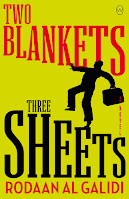Book Review: Two Blankets, Three Sheets by Rodaan Al Galidi
 |
4.5⭐
“Picture yourself waiting at a station or a bus stop with a few people, and not knowing when the next train or bus will arrive. Within fifteen minutes you’ll start feeling restless and will look around at the other people, who are getting restless too, and will also look around or at their watch. Now imagine a building with a few hundred waiting people, not for fifteen minutes, but for year after year. Not waiting for a bus or a train, but for their life to begin again.”
In February 1998, Samir Karim arrives in the Netherlands, seven years after leaving his home in Iraq. A civil engineering graduate, he flees Saddam Hussein’s Iraq to avoid being conscripted into the army. After seven years of forged passports, smugglers’ routes, and a kaleidoscope of experiences in various Asian countries, Karim applies for asylum and what follows is a complicated, frustrating and demoralizing nine-year wait for his resident status. His initial three months are spent in a reception center (RC) in Haarlem after which he is sent to an Asylum Seekers’ Center (ASC) which houses 500 asylum seekers like himself. Both the RC and the ASC allot “two blankets, three sheets, a towel, a pillow, and a pillowcase”, returnable upon the end of his stay.
“Inside the building there was an amazing smell. A smell I had never smelled before, and will never forget. And nowhere else in the whole world could you observe, at least not so clearly and for so long, what happened here: waiting. If waiting has a smell, then it is the smell that permeated the ASC. The make-up of the approximately five hundred residents changed sometimes monthly, sometimes weekly. People came and went. Some vanished, others appeared. And they all waited.”
As the narrative progresses we are introduced to numerous individuals who are housed in Samir’s ASC- people from different nationalities, of a different faith, male and female, young and old, each with different stories and each with dreams of starting over in a new country. While some wait for years on end, some are luckier. While some cases are approved, others are issued deportation orders. While some wait, with nowhere else to go, others take drastic steps. In Samir’s nine years at the ASC, he has witnessed eight people commit suicide. We follow Samir as he navigates the bureaucratic procedures, unreliable interpreters and apathetic lawyers while trying to survive on the allotted pocket money and the basic amenities provided in the ASC. Twice he attempts to leave The Netherlands and seek asylum elsewhere, once in Germany and once in Norway but was unsuccessful. He is a keen observer of the Dutch people, culture and society in general which makes for some entertaining anecdotes. Though some of the staff in Social Services are sympathetic to the plight of the ASC residents, they remain a stickler to the rules and restrictions imposed including prohibiting them from seeking work outside the ASC though they are allowed to leave the premises during the day. Samir, however, does his best to learn the language, work odd jobs and help as an interpreter. But it is impossible to be unaffected by the general feeling of isolation, despair and frustration within the center and its inhabitants.
Two Blankets, Three Sheets is an exceptionally well-written book. Some of the characters and their stories reduced me to tears, some made me smile and though the author injects his own characteristic brand of humor to diffuse the depressing tone of the narrative, it is difficult to laugh without feeling guilty for doing so. Though Samir is a fictional character, the author also mentions, ” People might ask me if this is my story, to which I will say: no. But if I’m asked if this is also my story, then I will say wholeheartedly: yes.”
I recently read a DRC of Rodaan Al Galidi’s forthcoming novel The Leash and the Ball which follows Samir in his life as a Dutch resident. I was so impressed with his writing that I could not resist grabbing a copy of this one and I am so glad that I did. (Both books are perfectly readable as standalone).
Excerpt from the Author’s Foreward:
“This book is fiction for the reader who cannot believe it. But for anyone open to it, it is nonfiction. Or no: let this book be nonfiction, so that the world I had to inhabit for all those years will be transformed from fiction into fact.”
Comments
Post a Comment